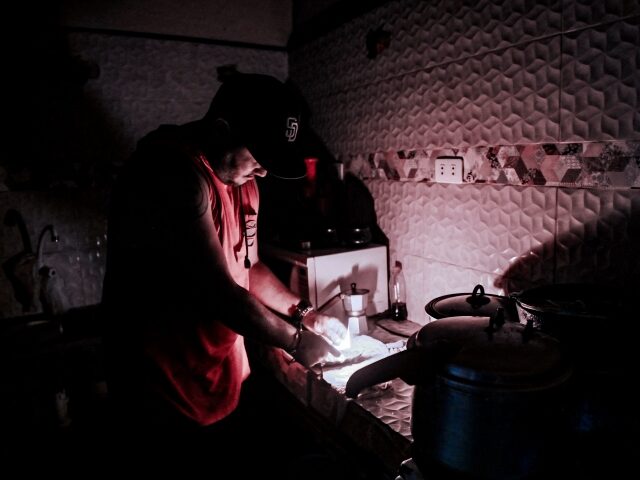Cuban citizens took to the streets nationwide on Monday to protest the communist Castro regime, specifically objecting to the nation’s collapsing power grid, which necessitates scheduled rolling blackouts.
The communist regime of Cuba had announced in July that a new rolling blackout schedule would begin to take effect in August. The capital city of Havana – which, unlike the rest of the nation, had so far been spared from the constant blackouts – will also be subjected to rolling power interruptions, a decision that Reinaldo García Zapata, governor of Havana, said he considers a “gesture of solidarity with the country.”
Residents of eastern Santiago de Cuba, the nation’s second-largest city, took up the streets to protest, espousing chants against the Castro regime such as “basta ya” (enough), “pongan la corriente, pinga” (“turn on the electricity, damn it!”), and “Díaz-Canel, singao” (“asshole Díaz-Canel,” a reference to the island’s figurehead president Miguel Díaz-Canel).
Ayer Jagüey Grande, Matanzas, hoy Altamira, Santiago de Cuba.
Los cubanos dijimos “Se Acabó”#SOSCuba🇺#PatriaYVida#LibertadYVida
pic.twitter.com/00BENsXVxc— Rosa María Payá A. (@RosaMariaPaya) August 1, 2022
“What they are doing to us is abuse. The whole morning without electricity and the power went out again at 11 in the morning,” activist Aurora Sancho said on Monday to the independent Cuban news outlet 14 y Medio. “It all started with a neighbor who started making noise with an iron and complaining. Little by little others joined him. Here people couldn’t take it anymore today.”
#Video Los vecinos toman las calles de #Altamira en #Santiago de Cuba para #protestar contra los #apagones 👉 https://t.co/Wj0vo8MEEQ "Todo empezó con un vecino que comenzó a hacer ruido con un hierro y a quejarse. Poco a poco se le fueron sumando otros" pic.twitter.com/tDGit478gl
— 14ymedio (@14ymedio) August 1, 2022
Sulaine Videaux, a resident of Santiago de Cuba, published a video on Facebook on Monday in which she explained that the recurring blackouts can last up to eight hours and relaying that protesters were chanting “down the dictatorship,” “down with Castro-Canel,” and “down with all the repressors of the Communist Party.”
Posted by Sulaine Videaux on Monday, August 1, 2022
The news website Diario de Cuba reported that cacerolazos — a form of protest where a group of people bang empty pots and pans to make noise — took place on Monday across the regions of San José de las Lajas, Mayabeque, La Herradura, Consolación del Sur, Pinar del Río, Trinidad, Sancti Spíritus, Antilla, Holguín, Caonao del Sur y Covadonga, en Cienfuegos, Mabay, and Granma.
⚠️⚠️#Urgente. Fuerte cacerolazo también en Trinidad… la gente ya no aguanta más!#CubaPaLaCalle pic.twitter.com/Qv6bWRqAMy
— Mag Jorge Castro🇺 (@mjorgec1994) August 2, 2022
In Cienfuegos, protesters looted one of the “Freely Convertible Currency” (MLC) stores that operate on the island. These locales are seen as symbols of the Castro regime and the dual-currency system that it has imposed on the nation. The products and offerings of these stores can only be paid for with Cuban convertible pesos, a currency that the nation’s citizens do not have free access to.
In Bayamó province, protesters chanted the communist slogan “¡El pueblo unido jamás será vencido!” (“the people united will never be defeated”) against the communist regime.
#Mabay, #Bayamo está en la calle. 🔥#CubaPaLaCalle pic.twitter.com/HY5rFcJ6KP
— Liborio (@yosoyliborio) August 2, 2022
Cuba’s precarious and aging power infrastructure is on the verge of complete collapse. The island largely depends on a series of constantly malfunctioning thermoelectric plants to generate its power. The plants have been reported to generate energy at less than 40 percent of their capacity — with some of the nation’s power infrastructure dating back to the Soviet era and having been patched up over the years way past its expected life cycle.
The Cuban regime has been addressing its energy crisis by obtaining a series of floating power ships from Turkey to help cover the growing power generation deficit on the island — they have not, however, been enough to remedy the situation, and Cuba’s energy crisis has worsened in 2022.
In May 2022, there were reports of blackouts lasting up to 14 hours per day, preventing Cubans from cooking in areas where cooking gas is not available. By July 2022, Liván Arronte Cruz, the Castro regime’s minister of energy, admitted that there is “no short-term solution” to Cuba’s worsening energy crisis.
The Cuban Observatory of Conflict, a civil society organization, released a report on Monday in which it notes that after the nationwide July 11, 2021, protests, another 3,266 protests have taken place against the Castro regime, with 1,713 having occurred during the first semester of 2022.
“The terror [of the communist regime] has not paralyzed the Cubans,” the report reads.
The report also details that the protests have increased due to the worsening blackouts, the collapse of Cuba’s health system, the latest dengue outbreak on the island, severe food and medicine shortages, and inflation.
Christian K. Caruzo is a Venezuelan writer and documents life under socialism. You can follow him on Twitter here.

COMMENTS
Please let us know if you're having issues with commenting.